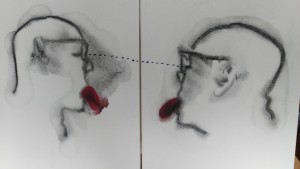Not only do we have a right to assert that others exist, but I should be inclined to contend that existence can be attributed only to others, and in virtue of their otherness, and that I cannot think of myself as existing except in so far as I conceive of myself as not being the others: and so as other than them. I would go so far as to say that it is of the essence of the Other that he exists. I cannot think of him as other without thinking of him as existing. Doubt only arises when his otherness is, so to say, expunged from my mind. (Marcel, Gabriel. Being and having. Read Books Ltd, 2013.)
Anti-solipsism is a thrilling idea. Not “being against solipsism”, but this reversal, this inversion, allowing existence to be something that those people have, and to recognize that there is no “I” that can be aligned with them. I look in the mirror, and I grant you that that person I see exists, but he is as opaque to me as any other. Furthermore, anybody who exists can die. That is true of everyone I encounter. But my own death is not something I can experience. I cannot wink out of existence.
If we refuse to believe in the cogito underlying experience, but we let experience be what it plainly is, then we are identical with its content. Is this any different from the repeated exhortation in the Chhandogya Upanishad, Thou art that! (Tat tvam asi!)
Or when Merleau-Ponty insists
We think we know perfectly well what ‘seeing’, ‘hearing’, ‘sensing’ are, because perception has long provided us with objects which are coloured or which emit sounds. When we try to analyse it, we transpose these objects into consciousness. We commit what psychologists call ‘the experience error’, which means that what we know to be in things themselves we immediately take as being in our consciousness of them. We make perception out of things perceived. And since perceived things themselves are obviously accessible only through perception, we end by understanding neither. We are caught up in the world and we do not succeed in extricating ourselves from it in order to achieve consciousness of the world. (Phenomenology of Perception, Chpt 1)
This is giddying. Solipsism is a hat we all tried on in our teens. It helped us to develop a scepticism about closed minds. Anti-solipsism is another thought exercise. It seems perfectly coherent. And not a million miles from the Buddhist concept of Anatta.
Post scriptum: Here’s a picture I did. It’s Solipsist vs Anti-Solipsist.

